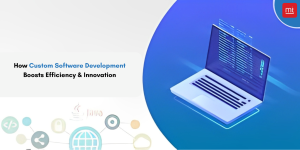What Are The Different Types of Mobile App Development?

Are you planning to invest in mobile apps development?
Firstly, we would like to appreciate businesses that are looking for a digital switch and eager to develop mobile apps. App development for Android or iPhone would be your profitable business decision in 2022. Because, in this mobile-first environment, be it a small company or multinational organization, companies can only reach their targeted audiences through digital or mobile app services.
Yes. Since smartphones have become an integral part of human lives, a business can reach out to a global audience and improve brand credibility through mobile app development.
Well!
If you are looking for app development, you might be in a big dilemma that which type of mobile app development would benefit your business and let you promote your brand aggressively across the world or in the regions you targeted.
In this article, we have given detailed information on significant mobile app development types and the tech stack behind them. So, based on your app requirements and its vision, you can choose the best and the right category to witness a big hit upon its launch in app stores.
Let’s get started!
Significant Types Of Mobile Apps Development
Here are three popular types of mobile applications.
Mobile App Development Type 1: Native Apps Development
Native mobile apps mean that a particular app is built to run on either Android or iPhone operating systems. Native apps ensure crash-free and flawless performance on their native platforms only.
In simple words, if you go for native android app development, then that particular app works on devices Android smartphones.
Advantages Of Native Mobile Apps Development
Here are the top benefits of native mobile applications:
- Native apps ensure superior performance on a specified platform.
- Native android or native iPhone apps are highly responsive and result in quick page load times.
- Since the apps will be stored on a dedicated mobile OS, native apps ensure high-level security.
- One of the best benefits of native apps is that UI designers can create outstanding native UI layouts and enhance user experiences.
- Developers can automatically customize native applications and make apps compatible with the current version of the device’s operating system.
- Native apps can access hardware components (like the camera and in-built microphone) of the smartphone.
- Availability of updated software development kits (SDK) and UI kits allows developers to create best-in-class apps with modern features and eye-pleasant user interfaces.
- On top of other discussed advantages, the chances of bugs in native app development are very less compared to hybrid development.
Mobile App Development Type 2- Web Apps Development
Web apps development is another best app development type that you can choose for targeting a wide range of audience base. Web apps can be accessed through the web or mobile browsers by toggling mobile data. It means that web apps do not need the device’s storage space.
Benefits Of Building Web Apps
- Web apps are enough capable to adapt to mobile and web OS features.
- Web apps are very responsive and promise better user engagement and improve their experiences.
- App maintenance and feature modifications are hassle-free which results in reduced costs and keeps your application up-to-date.
- Since they are accessible on a web OS and can be on a mobile OS, businesses can target both internet and smartphone users.
- Web apps will be automatically updated on the web-hosted servers. Hence, your users need not click on the UPDATE button too often to access the latest features of the application.
Mobile App Development Type 3- Hybrid or Cross-platform development
Hybrid mobile or cross-platform apps are web apps, but they deliver native experiences.
The best advantage with hybrid apps development is that developers can code for a single platform and reuse 95% of code for app development on other platforms. It will reduce development time and costs and ensure a quick app launch on app stores.
Pros Of Hybrid App Development Type
- Faster development
- App code can be distributed across various device operating systems.
- Mobile app developers make use of both web and native technologies such as HTML, CSS, Object C, and JavaScript UI frameworks to build interactive and quick responsive hybrid applications.
- You can add more device-friendly features and functionalities into hybrid apps and personalize the app experiences.
- Like native apps, users can access hybrid apps in offline mode. It will help organizations in clutching the attention of more users and increase app usage statistics and profits as well.
These are the three most popular app development types. We advise you that the development of a hybrid app is the best decision for targeting both Android, iPhone, and internet/web users. However, the development cost of native apps on different platforms is quite expensive and takes a lot more time than hybrid app development.
Apart from this cost consideration, if we go for Hybrid vs. Web apps, we confidently say that the development of hybrid apps is suitable for brands and startups. Since web apps highly depend on browser type and an internet connection, they are less efficient in delivering high speed and all-time access to app content.
We can guess what your mind is thinking about now. We hope it is about the app development cost.
How Much Does It Cost For Native Or Hybrid Or Web App Development?
This session would let you know about the cost of mobile applications. The mobile app development companies that you hire will consider so many factors to decide the final price of apps. The app development cost will depend on the below factors:
- Application development platform (Android, iPhone, or web OS)
- UI/UX design complexity
- The set of features and functionalities that your require
- Application categories such as shopping app, marketplace app, travel app, medical app, gaming app, etc.
- The technologies, tools, and UI frameworks that you picked for development
- Integration of third-party APIs
- Team size and hourly rate of a mobile app development company that you hire
These are a few essential factors to consider for estimating the overall cost of mobile app development. According to the app development companies, the cost of native or hybrid apps development would range from $25,000 to $200,000. However, this is an estimated price range and can be varied based on the factors that we discussed above.
So, instead of focusing on app development cost, focus on app quality, its functionalities, and its performance to give it a big success and get recognized quickly in app stores.
Wrapping Up
We hope that our article provided you with brief information on the three core types of mobile app development, their advantages, and factors that impact the cost to develop mobile apps. So, before hiring the app development company and kick-starting the development process, consider the above factors and head up confidently towards your dream mobile application development.
Author’s Bio
Prasanna Simhadri is an eminent tech writer. Her deep experience in delivering research-oriented content is coupled with impressive and incredible writing style will always grab the reader’s attention. She focuses on promoting and sharing factual and informational content on specific topics.


![Recover You Lost iPhone Data [Step-by-Step Guide] Recover You Lost iPhone Data](https://www.meetrv.com/wp-content/uploads/2025/06/Recover-You-Lost-iPhone-Data-300x200.png)



